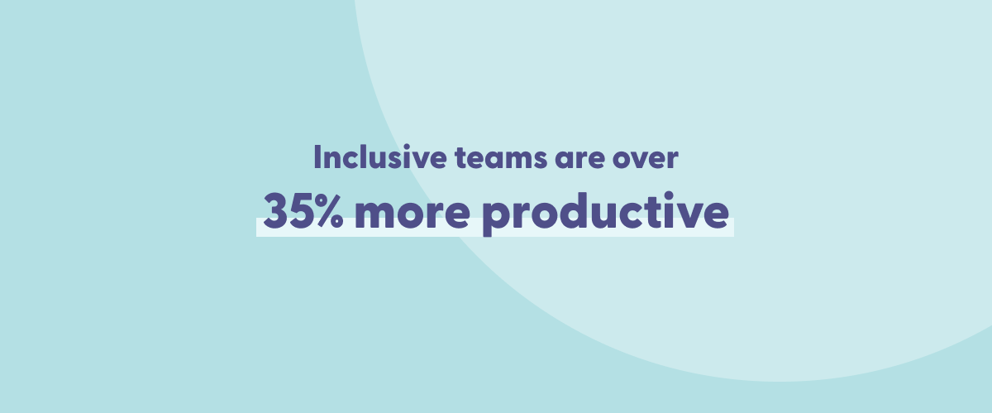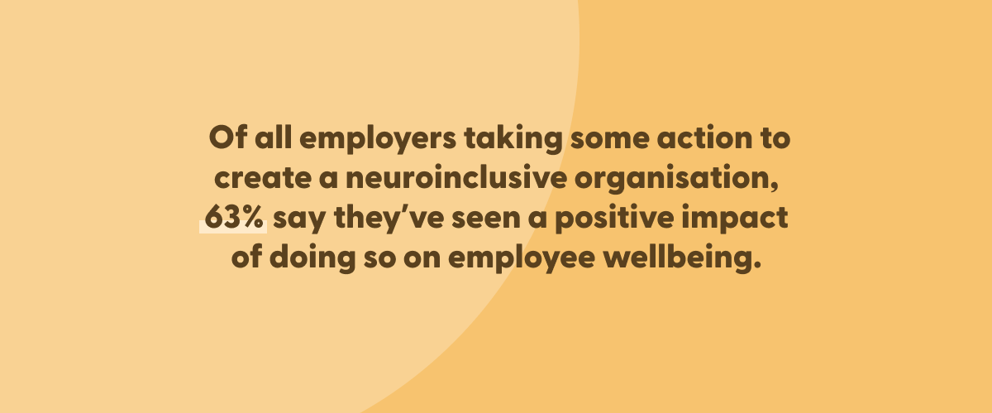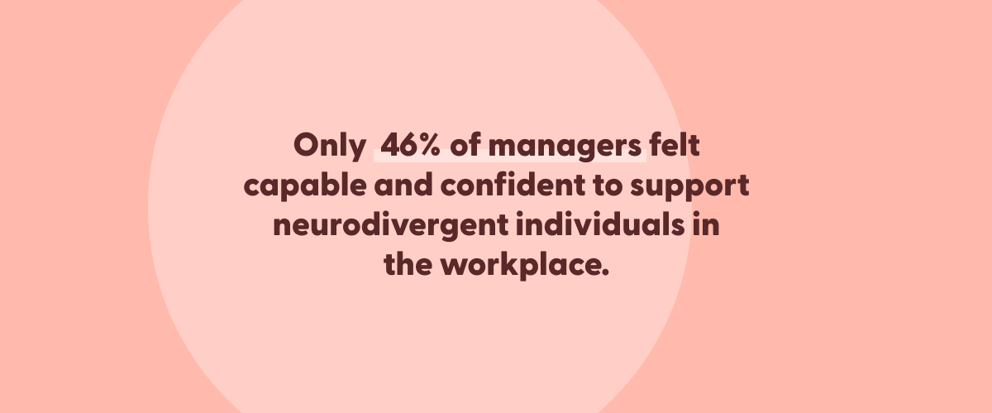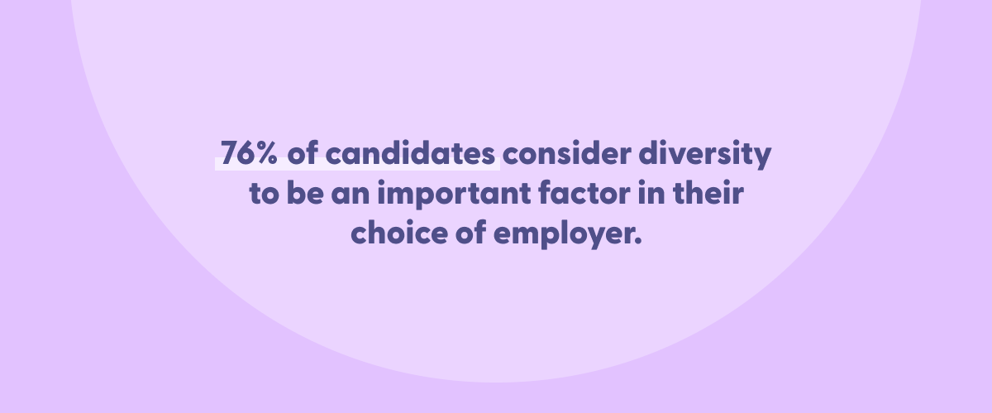10 meaningful ways to make your workplace more neuroinclusive
Neurodivergent brains work a bit differently from neurotypical ones, so the traditional office environment sometimes doesn't bring out the best in them.
Creating a neuroinclusive workplace that caters to diverse needs and minds will make your team happier, healthier, and more productive. Doing this important work on diversity in your workplace will benefit the whole organisation, not just certain individuals — recent LinkedIn stats show that companies with diverse, inclusive teams are more than 35% more productive.
Neurodivergent folks, like autistic people and those with ADHD, dyslexia, and some mental health conditions, have some brilliant strengths that make them wonderful employees. To keep hold of them, you need to make tailored adjustments to improve inclusivity — according to Birkbeck University, making these changes will mean neurodivergent staff are 50% less likely to leave.
There are lots of things you can do to help neurodivergent employees thrive and make your workplace more inclusive. And they’re easier to put into place than you might think…

Source: Research & Markets Report, 2024
1. Offer flexible working options
One of the best ways to make neurodivergent people feel comfortable in your workplace is to allow them to work in ways that fit their needs (wherever possible). The traditional 9-5 day doesn’t suit everyone. Can you keep core hours in the middle of the day but allow people to work as and when they’d like outside of these?
For lots of neurodivergent people, working from home where they can control their environments, the level of noise, the amount of socialising they do, light levels, and more, can massively improve mental health and productivity. The commute can be overwhelming and take a lot of energy, too, so skipping this can mean more energy to dedicate to work.
2. Plan inclusive social events
Not everyone has the same idea of fun. Traditional office parties often revolve around drinking and socialising, both of which can be daunting for some neurodivergent people. Instead, try to think of different sorts of events you could run that appeal to everyone.
Think about quieter gatherings where smaller groups get together, like board game nights or cooking sessions. And if you do plan a bigger party, make sure there are quiet spaces people can escape to if they get overwhelmed.
One of the most important things to remember when planning inclusive events is that not everyone will feel comfortable attending. Don’t make “forced fun” mandatory and try not to treat people who don’t attend any differently.
3. Be open to different working styles
Trust your team to get their work done, regardless of how they do it. This might mean someone needs silence to focus, can’t move from one task to another, or has a chaotic desk. None of these things mean they can’t do their job — they simply have a different way of doing things.
Are there any arbitrary rules you can relax? This could mean things like:
-
Uniforms. Allow people freedom with their clothing choices if possible. If they need to wear a uniform, give choices about the fit and fabric as some neurodivergent people are sensitive to different textures.
-
Body language. Don’t reprimand someone if they can’t sit still during a meeting or need to use a fidget toy to stay focused.
-
Video calls. If your team works remotely, give them the option to choose whether to have their camera on or not for video calls. For some people, having to watch themselves on the screen can be distracting.
4. Make the office neurodivergent-friendly
If your team needs to come into the office, create a sensory-friendly environment there. Make sure there are quiet spaces for people to work away from busy areas, adjust the lighting to avoid fluorescent lights and flickering, and steer clear of strong scents in cleaning products or air fresheners.
Let people use noise-cancelling headphones (or better yet, provide them) and make sure everyone knows when to approach their co-workers (for example, don’t interrupt someone when they’ve got headphones on). Normalise a “do not disturb” culture where it’s alright for someone to block out their calendar or turn their Slack/Teams app off.
Hot-desking can be tricky for some neurodivergent people too, so ask your team if they would prefer to have a fixed desk.

Source: Neuroinclusion at Work Report 2024 (CIPD)
5. Be clear, concise, and upfront when giving instructions
The best way to communicate with neurodivergent people at work is to be as clear as you can.
Ellie Middleton suggests giving instructions in the format “what, by when, and why.” This makes expectations clear from the beginning and allows the person receiving the instructions to get all the information they need (including context, which can be super important for neurodivergent people).
Getting into the habit of being clear when you give instructions will likely also help neurotypical workers get on with their tasks more efficiently and effectively.
6. Assign buddies
There are lots of intricacies of office politics that are hard for neurodivergent people to understand. For example, some autistic people find it difficult to read between the lines and need things that are usually unspoken to be made explicit.
One way to help people get to grips with the workplace is to assign buddies to new starters. Ideally, a buddy would be someone at the same level, so they feel comfortable asking for clarification. The buddy should explain any unwritten rules and help the new person navigate the office environment.
7. Ask your staff what they need
Get to know how people process information. Do they prefer to talk through a task or would they rather have it emailed to them? Can they answer questions on the spot or do they need time to process? Do they learn through reading or are they more visual?
Going further, you could create “how to work with me” guides that detail the ways everyone likes to work (both neurodivergent and neurotypical). This eliminates any anxiety around setting boundaries or asking co-workers how they like to receive information.
At a wider level, if someone has told you they’re autistic or have ADHD, ask them what would help. Listen when they tell you and try to make sure it’s implemented.
Arm yourself with information on how to get your people the support they need. Access to Work could be your best friend here — the government scheme offers grants to certain people (including neurodivergent folks) which can pay for workplace or mental health support.
8. Don’t expect staff to disclose, but create an environment where they feel comfortable to do so
Around 65% of neurodivergent workers haven’t disclosed their neurodivergence at work because they fear discrimination from their managers. According to the same study, a similar number feel as though there’s a lack of knowledge about neurodiversity amongst their colleagues.
Educating your whole organisation about neurodiversity is a great way to start the conversation. Work on creating a non-judgemental company culture where differences are understood, respected, and celebrated. That way, no one will ever need to feel uncomfortable about their brain working a bit differently from someone else’s.
The best way to do this is to have all managers trained on neurodiversity. Disability and neurodiversity training sessions like the ones run by our friends at neurobox will teach managers everything they need to know about neurodiversity in general, the strengths of common conditions under the neurodivergent umbrella, the language of neurodiversity, how to manage and neurodiverse team, and more.

Source: Neuroinclusion at Work Report 2024 (CIPD)
9. Make your recruitment process more inclusive
Traditional hiring practices tend to put neurodivergent applicants at a disadvantage as they don’t give them the space to shine. Imagine being a dyslexic person who’s asked to write a cover letter or rejected for missing a typo in your CV.
There are lots of things you can do to make your recruitment process more inclusive. Some options are:
-
Make sure your hiring team has gone through unconscious bias training.
-
Ask job-specific questions at the first stage, rather than relying on CVs and cover letters.
-
Give interviewees as much information as you can about who’ll be interviewing them — names, pictures, job descriptions, LinkedIn profiles etc.
-
Don’t expect everyone to present themselves in the same way at an interview. Some neurodivergent people find eye contact difficult or need longer to answer questions.
-
Provide interview questions ahead of time.
-
Give detailed instructions about how to get to your offices and provide pictures of landmarks where possible.
If you need more help with neuroinclusive recruitment, check out our friends at Autistica. They’ve recently launched the NDEI™ (Autistica Neurodiversity Employers Index), a gold-standard measure for neuroinclusion within businesses. They can help you assess how inclusive your organisation is and give you tips for improvements.

Source: Diversity & Inclusion Workplace survey 2020 (Glassdoor)
10. Get Brain in Hand
Sometimes neurodivergent workers need a bit of extra support to manage their work and emotions in day-to-day life. That’s where we come in.
At Brain in Hand, we provide personalised 1:1 coaching and digital tools to help people manage overwhelm, reduce anxiety, unlock independence and workplace success.
We work with organisations to support their teams, leading to increased confidence and participation among users, a rise in productivity, and more. Backed by the latest research, our solution can integrate with your existing employee wellbeing plan.
Creating an inclusive, non-judgemental work environment is key to allowing your team to do their best work. Don’t think of diversity and inclusion as a tick box exercise — creating a place where your team feels comfortable, happy and supported should be a genuine part of your long-term plan. Always be open to new ways of working, ask questions, and educate yourself on neurodiversity to make your workplace as inclusive as possible.
If you’d like to discuss how we at Brain in Hand can help your neurodivergent employees, get in touch now. Did you know, we can also be funded through Access to Work?

Unlocking Access to Work
The ultimate guide for employees and employers
Demystifying Access to Work with real, personal experiences from experts and applicants. Join us on Wednesday, 15th May at 1 PM on Zoom
Reserve your place